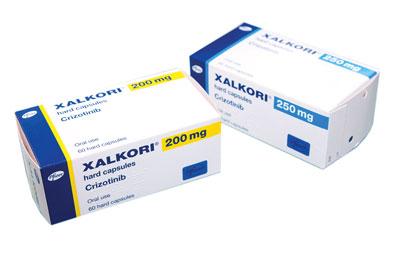
US rivals Pfizer and Merck team up for lung cancer
pharmafile | August 27, 2014 | News story | Medical Communications, Research and Development, Sales and Marketing | Merck, NSCLC, Roche, Xalkori, melanoma, pembrolizumab
The two biggest rival US pharma firms have joined forces to help develop a new combination treatment for certain non-small cell lung cancer patients.
The agreement will see Merck’s experimental PD-1 immunotherapy drug pembrolizumab combined with Pfizer’s new non-small cell cancer (NSCLC) drug Xalkori (crizotinib) in a Phase I study for patients with ALK-positive advanced or metastatic NSCLC.
The financial terms of the agreement were not disclosed.
Pembrolizumab is currently not approved anywhere in the world, but is expected to be given the green light in the US in the coming weeks for melanoma. It is also being assessed by the European Medicines Agency, with a decision expected early next year, again for melanoma.
It is one of range of new immunotherapy drugs known as programmed death 1 (PD-1), that can help the body’s immune system find and destroy cancerous tumours.
Pembrolizumab is also being studied in patients with non-small cell lung cancer and kidney cancer, and is expected to become a blockbuster treatment for the company.
Xalkori was approved by the FDA for a small patient population who are in the late-stage of NSCLC, and have the anaplastic lymphoma kinase (ALK) gene mutation, as determined by an approved diagnostic test.
Around 1-7% of patients express the ALK gene and this mutation is normally associated with non-smokers. The drug made around $400 million for Pfizer last year.
“This collaboration between Pfizer and Merck is just one example of the willingness of sponsors to work together in an effort to accelerate progress against some of the most difficult-to-treat cancers,” says Dr Mace Rothenberg, senior vice president of clinical development and medical affairs and chief medical officer for Pfizer Oncology.
“Understanding the effects of combining one drug, Xalkori, which inhibits an abnormally activated enzyme in patients with ALK-positive metastatic lung cancer, with the investigational drug, pembrolizumab, which harnesses the body’s immune system to fight cancer, is vital if we are to continue to advance the care of lung cancer patients.”
The multi-centre, open-label Phase I clinical study is expected to begin in 2015 and Pfizer says it will be the company to conduct the study.
This is also not the first research deal to be struck between the two firms as Merck and Pfizer previously said they would collaborate in combination trials of pembrolizumab, both with Pfizer’s approved Inlyta (axitinib) treatment for kidney cancer, and with an experimental drug called PF-2566 that Pfizer is evaluating in numerous cancer types.
PF-2566 stimulates activity of 4-1BB (CD-137), a protein involved in regulation of immune cell proliferation.
“We are pleased to build upon our ongoing collaboration with Pfizer to evaluate potential combination regimens incorporating Merck’s investigational immunotherapy pembrolizumab,” says Dr Eric Rubin, vice president of oncology at Merck Research Laboratories.
“Evidence from early studies of pembrolizumab monotherapy together with Xalkori’s proven targeted therapeutic approach provides the scientific rationale for evaluating this combination for the treatment of lung cancer.”
This is the second time this week that Merck has signed a research deal for pembrolizumab after it teamed up with Advaxis yesterday to use its drug, in combination with Advaxis’ listeria-based cancer immunotherapy ADXS-PSA, for the treatment of prostate cancer.
Ben Adams
Related Content

Roche receives CE Mark for blood test to help rule out Alzheimer’s
Roche has been granted CE Mark approval for its Elecsys pTau181 test, the first in …

Five facts about UV exposure and sun safety
1We can acclimatise to UV exposure. For example, we’re more likely to burn if there’s …

Roche candidate shows early promise for treating haemophilia A
Roche has announced encouraging early results from its phase 1/2 trial of NXT007, an investigational …






